The ‘Wicked’ phenomenon: How the once-panned musical became the biggest Broadway hit of the century
The ‘Wizard of Oz’ prequel marks 20 years, breaking ticket sales records and becoming a generational pop culture hit. As the release of the film version approaches, we examine the keys to its perennial success
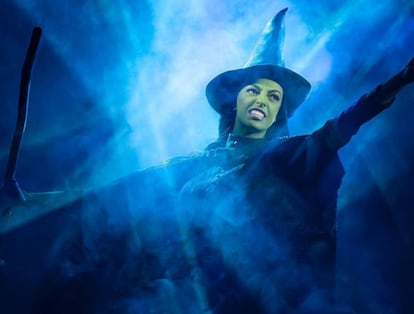
His journey with Wicked began in 2009, before he even knew the musical existed. Like so many others, Alejandro Largo, a 33-year-old theater technician, was hypnotized by the cover of “Defying Gravity,” the show’s most iconic song, that Lea Michele’s character Rachel sang on the first season of Glee. The affair was consummated seven years later when Largo traveled to New York. He decided to give the production a try. “It’s exciting, really fun, a blockbuster with expensive sets and beautiful costumes. It left me flabbergasted and obsessed. Since then, I listen to its songs on loop and I’ve downloaded all of the videos of it online.”
Millions of people all over the world share his devotion and enthusiasm for a show that, in 2023, celebrates its 20th anniversary, breaking records and becoming the second highest-grossing show in the history of Broadway. “Fans turn the show into a religion, spending hundreds—thousands—of dollars on repeat visits,” writes The Daily Beast. Based on the book by Gregory Maguire, Wicked is a sort of prequel to The Wizard of Oz that recounts the one-time friendship, and later rivalry, between two young women, the shy Elphaba and the popular Glinda, who end up becoming the Wicked Witch of the West and the Good Witch of the North, respectively. The hit has been performed in over a hundred cities, including London, Tokyo and Melbourne, and it is now set to expand its charm to movie theaters the world over. The first images of the film adaptation, which stars Ariana Grande and Cynthia Erivo whose first installment to be released on November 27, 2024, have shaken up social media. But what is behind the success of the biggest musical phenomenon of the century?
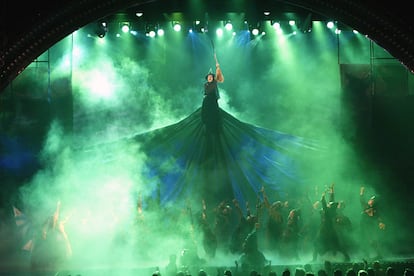
“It’s a show full of attractions for a global audience,” says Fernando De Luis-Orueta, producer of the theater company La Tropa Produce. “It starts from an iconic reference for the whole world. Whether or not you’ve seen The Wizard of Oz, it’s part of your collection. As a show, it’s really lavish, with a set full of tricks and moments that leave you with your mouth open, and bombastic songs that the ear can’t resist.” Other keys to its long romance with the public: its familial spirit makes it enjoyable for children and adults alike, and the protagonists are two women, making it a reference for recent Hollywood hits like Frozen.
The show’s creators were the first to be surprised by the hit. “Never in a million years” did they expect it. The theater press didn’t expect it either. They mercilessly criticized the show during the early days of its run, when it faced runs with empty seats and losses at the Tony Awards. Critics called the production “pretentious,” “overproduced,” “confusingly dark” and “a waste of talent.” They didn’t anticipate a fan phenomenon that embraced its approach to one of society’s favorite topics: marginalization, ostracization and being misunderstood. Anyone who has felt like an outsider can identify with Elphaba, the work’s protagonist. The musical’s producer, Mark Platt, knew that the feeling was key to the hit. “I’ve long been attracted to characters who are outsiders. The movie Philadelphia was about an attorney-outsider. Legally Blonde was about a blond girl who’s an outsider because she’s not smart. Those films and Wicked may be different in tone and nature, but they tap into something that’s in all of us,” he told the Chicago Tribune.
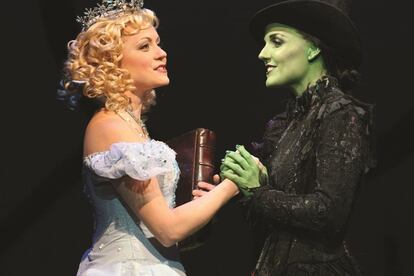
That theme is one of the reasons for the musical’s success with the LGBT+ community, “key,” as De Luis-Orueta says, to its long success. “Its relationship with the community has its roots in The Wizard of Oz, in Judy Garland, ‘Over the Rainbow,’ Stonewall and the rainbow flag itself. Wicked has taken up that torch, becoming a referent that current generations perceive as their own, as contemporary,” he says. Dozens of essays online attempt a queer reading of the show. Its composer and librettist, Stephen Schwartz, proudly shares the stories of young gays who thank him for the musical’s role in their process of accepting their sexuality. “Beyond the topic and how queer The Wizard of Oz is, Wicked resonates in a special way because Broadway is also almost mythological in the gay imaginary,” Alejandro Largo adds.
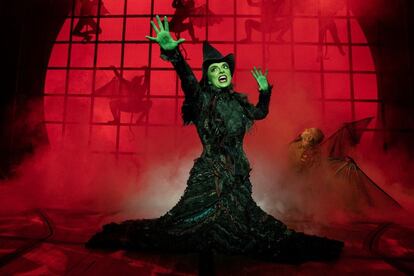
Having conquered the public in the Big Apple, it remains to be seen whether the film adaptation directed by Jon M. Chu (Crazy Rich Asians) will cement Wicked’s candidacy to the most popular millennial musical on a global level. The movie marks Ariana Grande’s debut as a protagonist in a Hollywood super-production. And Universal has planned its release for Thanksgiving, one of the weeks with the highest movie-going rates of the year. According to IMDB Pro, the budget for the two films also surpasses $310 million, making them two of the most expensive musicals in film history.
The division into two films has awakened skepticism among experts. “If they manage to add to the original material and expand the story while remaining faithful, it can save it. But if dividing it into two movies is a purely unnecessary commercial decision, it could doom it,” says Largo. Fernando De Luis-Orueta agrees: “The biggest question is if the building will stand if divided in two.”
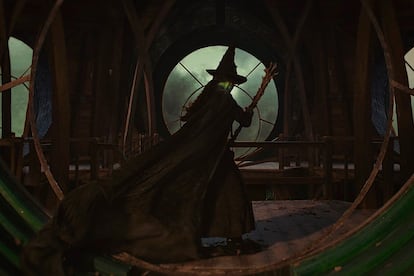
Sign up for our weekly newsletter to get more English-language news coverage from EL PAÍS USA Edition
Tu suscripción se está usando en otro dispositivo
¿Quieres añadir otro usuario a tu suscripción?
Si continúas leyendo en este dispositivo, no se podrá leer en el otro.
FlechaTu suscripción se está usando en otro dispositivo y solo puedes acceder a EL PAÍS desde un dispositivo a la vez.
Si quieres compartir tu cuenta, cambia tu suscripción a la modalidad Premium, así podrás añadir otro usuario. Cada uno accederá con su propia cuenta de email, lo que os permitirá personalizar vuestra experiencia en EL PAÍS.
¿Tienes una suscripción de empresa? Accede aquí para contratar más cuentas.
En el caso de no saber quién está usando tu cuenta, te recomendamos cambiar tu contraseña aquí.
Si decides continuar compartiendo tu cuenta, este mensaje se mostrará en tu dispositivo y en el de la otra persona que está usando tu cuenta de forma indefinida, afectando a tu experiencia de lectura. Puedes consultar aquí los términos y condiciones de la suscripción digital.









































